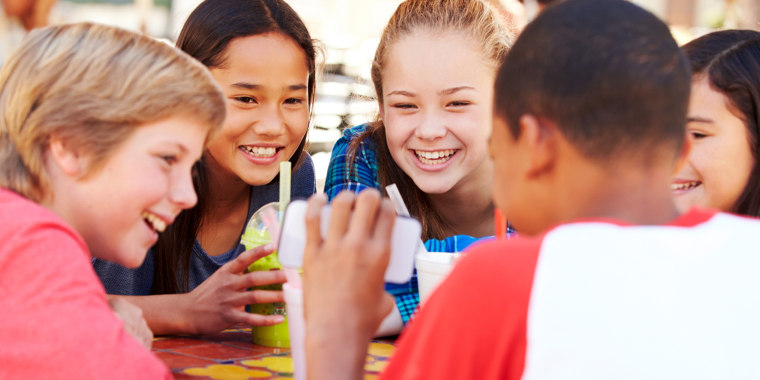Want to help your eighth-grader with their social awareness skills? Here are some tips that experts suggest.
Keep the communication lines open
Your eighth-grader's social world broadens during middle school, and it’s important to take the time to regularly talk to him openly and honestly about their feelings and friendships. Whether it’s at the dinner table or right before their bedtime, have frequent chats with them about their social life and their role as a friend. Try not to be too judgmental while having these discussions, as this can cause them to withhold information or not want to talk about these issues at all. Director of Rutgers Social and Emotional Learning Lab Maurice Elias says that it’s good to always offer to drive for your teen and their friends. Elias adds that you will learn a great deal by listening to their conversations in the car, and you will also get to know more about their friends and what they are doing.
Nurture your adolescent's empathy
Middle school is an awkward time for any young person. It may involve a move to a larger school with more peers and going between classrooms for the first time. Your eighth-grader may feel uncertain in this new and shifting social scene. They may also be nervous about making friends. By talking to them and explaining that everyone else is going through the same challenges, you can help them better understand their peers and the importance of using empathy in their social interactions. You may also want to encourage them to make new friends or join school clubs and organizations to get to know different people. New York City-based teacher Anne Harlam adds that if your teen is more introverted, you should try not to push them into social situations or put too much pressure on them to meet new people. Harlam suggests that you allow your adolescent to make friendships at a pace with which they are comfortable, and give them the support that they may need to overcome their social challenges.
Get to know your middle-schooler's guidance counselor
Maurice Elias says that counselors can be a good source of information about what is happening in school, and if you notice changes in your child’s behavior that you can’t explain, you can check in with them. There could be things happening at school that you should know about, particularly bullying or cyberbullying. The counselor can be a big help in understanding and, in some cases, reaching out to your teen.
Books can spark conversations about bullying
Many schools have programs about these topics that involve books and other readings, and finding out about these can open up conversations about their content with your adolescent. If your eighth-grader seems to have some concerns about bullying, look for natural opportunities to mention books about the topic, like Freak by Marcella Pixley, Wonder by R. J. Palacio, and Cornered: 14 Stories of Bullying and Defiance by Rhoda Belleza. These books lead naturally to a discussion about the forms that bullying can take. You can also ask them if they ever dealt with bullying or cyberbullying, and work together to figure out ways they can handle these types of situations in the future.
To learn more about social awareness for your child, check out our eighth-grade social awareness page.
Parent Toolkit resources were developed by NBC News Learn with the help of subject-matter experts, including Maurice Elias, Director, Rutgers Social-Emotional and Character Development Lab, and Anne Morrison, Pre-Kindergarten Teacher, Lycée Français de New York.
